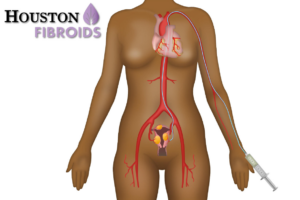Do you know the warning signs of Pelvic Congestion Syndrome (PCS)? (Also known as ovarian vein reflux?) They include pelvic pain and incontinence, symptoms that often indicate conditions such as uterine fibroids. Unfortunately, that can make it harder to diagnose PCS, a medical problem that is triggered by internal varicose veins in your lower abdomen and pelvis. In this post, we review how to differentiate symptoms of PCS from other pelvic conditions. That way you can get a diagnosis and begin appropriate treatment.
PCS is fairly common, and is the underlying cause of chronic pelvic pain for between 13 and 40% of women, according to the British Society of Interventional Radiology. Yet it is often misdiagnosed as Polycisystic Ovarian Syndrome (PCOS), Premenstrual Dysphoric Disorder (PMDD) or endometriosis. That was the case for Johnelle Mercer, a 19-year-old woman from Las Vegas who spent years suffering before finally getting diagnosed.
From the time of her very first period, Mercer experienced terrible pelvic pain. Her periods were very heavy, and she lived with breakthrough bleeding between periods. But every time she discussed her symptoms with doctors, they told her she just had bad periods.
Sick of being ignored and dismissed, this brave young woman kept advocating to get a diagnosis that would offer pain relief. Finally, at the age of 19, she received that diagnosis: PCS. And she bravely shared her diagnosis experience with this viral Tik Tok video.) In celebration of her efforts to improve the diagnostic process, we want to provide a better understanding of this hard-to-diagnose source of pelvic pain. Because we want you to find relief sooner than Johnelle did. And, with that in mind, here’s what you need to know about PCS in order to receive the proper diagnosis and treatment:
When too much blood builds up in your pelvis, you develop painful PCS; internal varicose veins are often at fault. Individuals with PCS experience dull, aching pelvic pain over an extended period of time. Women are more likely to develop PCS than men, but both genders can be affected.
When men are affected by PCS, the condition is easier to diagnose and treat, because two of men’s four pelvic veins are visible on the outside of their bodies. Unfortunately, all of women’s pelvic veins are invisible on the surface of their bodies, making it harder to spot PCS in women. Now, most women with PCS have previously been pregnant or have additional risk factors, but even women who’ve never had a pregnancy can develop the condition.
Typically, we think of PCS as a problem for premenopausal women. Recently, studies suggest that menopause doesn't always offer relief from PCS. In fact, it turns out that some women first develop symptoms after menopause. Clearly, we need to learn more about the causes of this condition.

As we already mentioned, PCS develops because of varicose pelvic veins. Varicose veins in the pelvis begin to develop when their valves fail; next, blood that should be pushed out of the pelvis pools in the area. When this happens, the veins become dilated and put pressure on sensitive areas of the pelvis and on the pelvic floor muscles (the ones you exercise when doing your Kegels.)
Again, women who've had at least one pregnancy are also more likely to develop this condition. And that's likely because carrying a baby brings more blood flow to the area.
Still, we aren't clear why your valves would fail. Sometimes, the cause seems to be late-pregnancy injury. In other cases, excess estrogen may be the cause, since the hormone can widen your blood vessels. PCS may also be a secondary symptom for people with May-Thurner syndromes. Regardless of the cause, the condition presents with uniform symptoms.
PCS usually causes women to experience pain deep in their pelvis or uterus; the pain is usually dull or aching rather than sharp or intense. PCS pain gets worse all day, especially if you exercise.
While PCS pain is typically dull, changes in posture or heavy lifting can cause women to experience sharp pains in their abdominal area. (Lying down can help bring relief.) With PCS, sex and periods can also become more painful.
Some women with PCS also have bladder symptoms that include a frequent need to pee, frequent nighttime trips to the bathroom and even incontinence. Many women will also develop vaginal or vulvar varicose veins. On diagnostic imaging, we'll also notice an increase in the volume of your pelvic veins. And for men and women, PCS can also cause or worsen conditions such as Irritable Bowel Syndrome (IBS), or lead to chronic fatigue and back pain.
PCS is usually diagnosed after 6 months of chronic pelvic pain without signs of an inflammatory condition. And that’s because symptoms like pelvic pain can be indicative of other conditions, including uterine fibroids. Yet there are some ways to differentiate your pain, helping speed up your diagnostic process.
In addition to pain in your pelvis and lower back, PCS can trigger an irritable bowel and/or bladder and painful sex. It may also cause visible varicose veins to appear in or around your vulva, vagina, perineum and anus. Additionally, with this condition, your pelvis can feel an uncomfortable sensation of fullness.
We typically diagnose PCS with an ultrasound scan. Then, your Houston interventional radiologists can treat PCS with Pelvic Vein Embolization (PVE). (This is a procedure that's similar to Uterine Fibroid Embolization, or UFE.) Recently, the Society of Vascular Surgeons endorsed this treatment option for resolving PCS.
We use deep conscious sedation for this procedure. Then, guided by ultrasound, we insert a catheter (thin tube) to reach the problematic pelvic vein. Once there, we deposit embolizing material to permanently block off the vein or veins causing your PCS symptoms. After, blood can't build up in the area. Your vein will shrink and symptoms should resolve in the weeks that follow.
With proper care and a minimally invasive procedure, we can resolve PCS. Our highly trained vascular specialists can detect PCS symptoms and recommend a treatment plan. If you’re experiencing dull, aching pelvic pain, you should request a consultation . Remember, you don’t have to live with chronic pelvis pain—you just need to receive the proper diagnosis and treatment plan!
Sources: www.Cedars-Sinai.Org
As leading fibroid specialists in Houston, we can help you get back to doing the things you love – free of pain and symptoms associated with this diagnosis.

Scheduling
Please contact our dedicated specialists to schedule a consultation today.
2025 Houston Fibroids. All rights reserved. Website Design by Healthcare Success